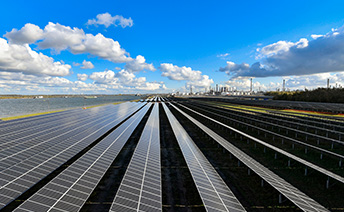European Round Table for Industry (ERT)
ERT is a forum that brings together CEOs and chairs from around 60 of Europe’s largest companies in the industrial and technological sector.[1] ERT supports a strong, open and competitive Europe through which it promotes sustainable growth, jobs and prosperity.[2]
Membership of board/executive committee: None
- 2022 assessment outcome: Aligned
- 2021 assessment outcome: Aligned
Summary
Shell benefits from its membership of ERT as an executive-level industrial network that engages with the EU on strategic issues.
We have found ERT to be aligned with our climate and energy transition-related policy positions.
We will remain a member of ERT. We will continue to engage the association on climate and energy transition topics. We will continue to track alignment between ERT’s climate and energy transition-related positions and our own.
Further information
Click on the sections below to read more.
Paris Agreement and net-zero emissions
- ERT has stated support for the temperature goal of the Paris Agreement.[3] [4]
- ERT has stated support for the EU’s target of climate neutrality by 2050.[5]
- In its 2022 paper, Industrial Competitiveness facing an existential crisis, ERT stated support for the EU Green Deal and the Fit for 55 policy package.[6]
Carbon pricing
- ERT has stated support for carbon pricing and the EU ETS.[7] [8]
- In its 2022 paper, Industrial Competitiveness facing an existential crisis, ERT stated support for the reinforcement of the EU Emissions Trading System (ETS) and that “the EU-ETS with effective carbon leakage measures – including indirect CO2 cost compensation measures for the electro-intensive industry – should remain a central pillar of a successful transformation towards climate neutrality, while at the same time maintaining the competitiveness of European industry.”[9]
Energy efficiency
- In its 2022 statement on EU Energy Policy, ERT stated that “European measures for energy efficiency policy must be accelerated”, for example through strengthening the provisions of the Energy Efficiency Directive, building energy management systems and accelerating the utilisation of current technologies and solutions.[10]
- In its 2022 Accelerating Decarbonisation paper, ERT stated that “the introduction of the ‘energy efficiency first’ principle in the recast of the Energy Efficiency Directive must be implemented along the entire value chain.”[11]
Decarbonised hydrogen
- ERT has stated support for policies to produce decarbonised hydrogen and recognises different ways to produce it.[12]
- In its 2022 paper on Boosting the EU Hydrogen Economy, ERT stated that incentives should be created for “end users to boost demand/off-take […] until low-carbon and renewable hydrogen become competitive”.[13]
- In its 2022 Statement on EU Energy Policy, ERT stated it was calling for the EU to accelerate the “deployment of renewable and low-carbon hydrogen” and stated support for the “swift adoption of the Hydrogen & Decarbonised Gas Market Package”.[14]
Natural ecosystems
No position
Carbon capture and storage
- ERT has stated support for policy mechanisms to incentivise carbon capture and storage (CCS).[15] In its 2022 paper, Industrial Competitiveness facing an existential crisis, ERT states: “Appropriate funding and a regulatory framework which incentivises both the development and industrialisation of carbon capture and storage as well as direct air capture and storage (CCS and DACCS) are essential.”[16]
- In its 2022 Statement on EU Energy Policy, ERT calls for further promotion of CCUS and for “the right incentives and framework rapidly to deploy [CCUS] projects”.[17]
Environmental, social and governance (ESG) standards and benchmarks, sustainable finance taxonomies
- ERT supports the need for global coordination and consensus-building on ESG standards.[18]
- ERT has stated that “it is important that the EU Taxonomy facilitates a successful energy transition throughout the entire value chain while taking careful consideration of the range of challenges that companies and industries face in their journey to decarbonise.”[19]
- In its 2022 paper Towards an EU Action Plan for a Digitally Enabled Green Transition, ERT stated that “the EU sustainable finance taxonomy does not adequately incentivise investment in the twin transition, due to the lack of acknowledgement of digital technologies.”[20] It also stated “the EU sustainable finance taxonomy should be revised to recognise fully the enabling role of digital alongside a review of the treatment of digital technologies in public procurement around decarbonisation.”[21]
Coal
No position
Electrification with renewable or low-carbon power
- In its 2022 Statement on EU Energy Policy, ERT stated support for “accelerating the deployment of renewable and low-carbon energy”.[22] It also stated that “the EU must invest simultaneously in the expansion and digitalisation of electricity infrastructure as well as the build-up of hydrogen infrastructure to accelerate the roll-out of renewable and low-carbon power and enable efficient integration.”[23] ERT also stated that it “supports the ambitions of RePower EU” and “calls for a swift adoption of the Renewable Energy Directive (RED)”.[24]
- In its 2022 Accelerating Decarbonisation paper, ERT states that “efforts should be stepped up for the electrification of end-uses, wherever possible.”[25]
Gases and methane
- In ERT’s 2022 Statement on EU Energy Policy, it states that accelerating the production of biomethane, hydrogen and biomass in Europe is critical.[26] It also stated support for the REPowerEU plan’s goal to accelerate permitting procedures for renewable and low-carbon energy deployment (including biomethane and hydrogen) and the expansion of networks. It called on the European Commission to produce “concrete proposals to make REPowerEU a reality”.[27]
- ERT has not stated positions in support of the direct regulation of methane or ending routine flaring by 2030 or sooner.
Road transport: Passenger cars and vans
- In its 2022 Accelerating Decarbonisation paper, ERT states that “efforts should be stepped up for the electrification of end-uses, wherever possible, especially of transport, buildings and industrial processes.”[28]
Road transport: Heavy-duty vehicles
No position
Heavy industry decarbonisation
- In its 2022 Industrial Competitiveness paper, ERT states “The RePowerEU package aims to accelerate decarbonisation, but is not focused enough at preserving the EU’s competitiveness. In the short term, the EU needs to adapt its strategy to support decarbonisation in a way that also strengthens and protects its industrial competitiveness.”[29] It also stated that “policy measures should also maintain carbon leakage protection and provide incentives for other countries to decarbonise their production.”[30]
Aviation
No position
Shipping
No position
Return to list of associations[1] https://ert.eu/about/
[2] https://ert.eu/about/
[3] https://ert.eu/wp-content/uploads/2020/12/ERT-Paper-Making-the-most-of-Europes-climate-leadership_December-2020-1.pdf
[4] https://ert.eu/documents/ert-brt/
[5] https://ert.eu/wp-content/uploads/2022/05/ERT-statement-on-EU-energy-policy-May-2022.pdf
[6] https://ert.eu/wp-content/uploads/2022/10/ERT-Industrial-Competitiveness-Alert_PP_Oct-2022.pdf
[7] https://ert.eu/wp-content/uploads/2021/10/International-CEO-Climate-Statement-FINALv2.pdf
[8] https://ert.eu/wp-content/uploads/2022/10/ERT-Industrial-Competitiveness-Alert_PP_Oct-2022.pdf
[9] https://ert.eu/wp-content/uploads/2022/10/ERT-Industrial-Competitiveness-Alert_PP_Oct-2022.pdf
[10] https://ert.eu/wp-content/uploads/2022/05/ERT-statement-on-EU-energy-policy-May-2022.pdf
[11] https://ert.eu/wp-content/uploads/2022/12/ERT-Expert-Paper-Accelerating-Decarbonisation.pdf
[12] https://ert.eu/wp-content/uploads/2021/11/ERT-Expert-Paper-Enablers-for-investing-in-hydrogen-in-Europe-1.pdf
[13] https://ert.eu/wp-content/uploads/2022/12/ERT-Expert-Paper-Boosting-the-EU-Hydrogen-Economy.pdf
[14] https://ert.eu/wp-content/uploads/2022/05/ERT-statement-on-EU-energy-policy-May-2022.pdf
[15] https://ert.eu/wp-content/uploads/2022/10/ERT-Industrial-Competitiveness-Alert_PP_Oct-2022.pdf
[16] https://ert.eu/wp-content/uploads/2022/10/ERT-Industrial-Competitiveness-Alert_PP_Oct-2022.pdf
[17] https://ert.eu/wp-content/uploads/2022/05/ERT-statement-on-EU-energy-policy-May-2022.pdf
[18] https://ert.eu/wp-content/uploads/2021/05/ERT_Expert-paper_RSFS-FINAL.pdf
[19] https://ert.eu/wp-content/uploads/2021/05/ERT_Expert-paper_RSFS-FINAL.pdf
[20] https://ert.eu/wp-content/uploads/2022/10/ERT-Digital-Green-Transition-Expert-Paper-final.pdf
[21] https://ert.eu/wp-content/uploads/2022/10/ERT-Digital-Green-Transition-Expert-Paper-final.pdf
[22] https://ert.eu/wp-content/uploads/2022/05/ERT-statement-on-EU-energy-policy-May-2022.pdf
[23] https://ert.eu/wp-content/uploads/2022/05/ERT-statement-on-EU-energy-policy-May-2022.pdf
[24] https://ert.eu/wp-content/uploads/2022/05/ERT-statement-on-EU-energy-policy-May-2022.pdf
[25] https://ert.eu/wp-content/uploads/2022/12/ERT-Expert-Paper-Accelerating-Decarbonisation.pdf
[26] https://ert.eu/wp-content/uploads/2022/05/ERT-statement-on-EU-energy-policy-May-2022.pdf
[27] https://ert.eu/wp-content/uploads/2022/05/ERT-statement-on-EU-energy-policy-May-2022.pdf
[28] https://ert.eu/wp-content/uploads/2022/12/ERT-Expert-Paper-Accelerating-Decarbonisation.pdf
[29] https://ert.eu/wp-content/uploads/2022/10/ERT-Industrial-Competitiveness-Alert_PP_Oct-2022.pdf
[30] https://ert.eu/wp-content/uploads/2022/10/ERT-Industrial-Competitiveness-Alert_PP_Oct-2022.pdf










